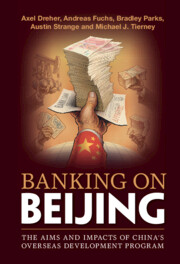Book contents
- Banking on Beijing
- Banking on Beijing
- Copyright page
- Contents
- Figures
- Tables
- Acknowledgments
- Abbreviations
- 1 Why Do We Know So Little about the Aims and Impacts of China’s Overseas Development Program?
- 2 The Journey to Global Creditor
- 3 Counting and Comparing Apples and Dragon Fruits
- 4 Follow the Money
- 5 Apples and Dragon Fruits
- 6 Aid à la Carte
- 7 Paving the Way to Growth and Development?
- 8 Poisonous Dragon Fruits?
- 9 Banking on the Belt and Road
- Postscript: Analysis of China’s Overseas Development Program During the BRI Era With an Updated Dataset
- References
- Index
8 - Poisonous Dragon Fruits?
The Side Effects of Chinese Development Finance
Published online by Cambridge University Press: 21 April 2022
- Banking on Beijing
- Banking on Beijing
- Copyright page
- Contents
- Figures
- Tables
- Acknowledgments
- Abbreviations
- 1 Why Do We Know So Little about the Aims and Impacts of China’s Overseas Development Program?
- 2 The Journey to Global Creditor
- 3 Counting and Comparing Apples and Dragon Fruits
- 4 Follow the Money
- 5 Apples and Dragon Fruits
- 6 Aid à la Carte
- 7 Paving the Way to Growth and Development?
- 8 Poisonous Dragon Fruits?
- 9 Banking on the Belt and Road
- Postscript: Analysis of China’s Overseas Development Program During the BRI Era With an Updated Dataset
- References
- Index
Summary
In this chapter we focus on the intended and unintended side effects of Chinese development finance, which we address from two different angles, both at the country level and at subnational scales. In the first part of this chapter, we investigate whether and to what extent Chinese-financed aid and debt affect recipient countries’ propensity for civil conflict and environmental degradation. We then turn to the question of how Chinese-funded projects might affect the quality of governance in recipient countries and regions. China claims to follow a policy of non-interference in the domestic affairs of sovereign governments, which implies that its allocation decisions are made without considering the quality of governance, so that Chinese funds might prop up rogue regimes and delay much-needed governance reforms. The second part of this chapter turns to the popular claim that significant financial support from China impairs the effectiveness of aid from Western donors and lenders. Specifically, we investigate whether the effects of World Bank aid differ in countries or subnational regions that receive large volumes of Chinese support compared to other recipients.
- Type
- Chapter
- Information
- Banking on BeijingThe Aims and Impacts of China's Overseas Development Program, pp. 247 - 281Publisher: Cambridge University PressPrint publication year: 2022

